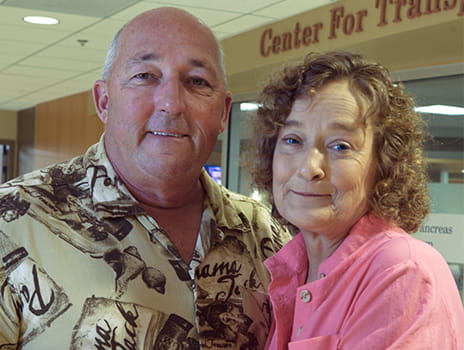Kidney Transplant Leads to Triumph Over Tragedy

In recognition of the Christmas and New Year’s holidays, some of The University of Kansas Health System’s offices will have modified hours on Thursday, December 25, and Thursday, January 1.

Cathy Robertson is a fighter. Just ask her husband, friends or any of her 5 children and 32 grandchildren and great-grandchildren. When the fight was for her life, the close-knit Wichita family learned the depth of this strength.
In July 2014, at age 52, Cathy received a lifesaving kidney transplant. The journey to this important moment was a testament to her strength.
In mid-2012, Cathy felt a tightening in her skin and joints – pain she attributed to arthritis. A few months later, her blood pressure tested unusually high during a routine eye exam.
"I thought it was just a fluke," she says. "I felt absolutely great, so this wasn't really alarming to me. We didn't realize this was an indication of anything big."
It was the tip of the iceberg. In February 2013, Cathy began having seizures. Her blood pressure continued to climb, and medication had only a limited effect. Physicians would eventually diagnose her with scleroderma, an autoimmune disease that hardens and damages skin and connective tissues. The scleroderma caused her blood pressure to gradually increase, critically damaging her kidneys.
She began dialysis within a week of her first seizure and was told she needed a transplant.
"Everything happened very fast," her husband Bob recalls. "She is our rock, so very strong, and she tried not to get depressed thinking that this may be long-term, but we knew our life was changing."
Just a few days into dialysis, the couple faced another scary detour. Cathy developed Stevens-Johnson syndrome, a rare and severe allergic reaction to her anti-seizure medication. The life-threatening condition caused the top layer of her skin to blister and peel all over her body, sending her to a hospital burn unit where she was placed in a medically induced coma for more than 7 weeks.
Doctors advised Bob to begin making funeral arrangements. Patients with such severe symptoms have a 95% chance of dying, they cautioned him.
"They didn't know Cathy," Bob says. "I just told them she has a 5% chance, and she will fight through this."
And she did. Cathy gradually recovered over the next few months and returned home in October 2013.
We offer a variety of appointment types. Learn more or call 913-588-1227 to schedule now.
When the Robertsons learned Cathy needed a transplant, they chose The University of Kansas Health System, impressed by its excellent patient outcomes and location.
"We’re Kansans, and it feels good to find this level of care here," Cathy says.
In May 2014, Cathy was placed on the transplant center's wait list. A midnight phone call just a few months later on July 30 took them by surprise. A kidney was available for transplant right away.
"Getting that call was the most exciting thing that could ever happen," Cathy says. "We had a bag packed and ready to go. This was just the next step."
It was a big next step, and the transplant center's care team helped Bob and Cathy navigate this part of their journey.
"It was a lot to take in," Bob says. "Right out of the gate, we knew very little. They sat us down and really counseled us prior to transplant – doctors, surgeons, nurses and financial counselors. Everyone we worked with was heartfelt. It really put our minds at ease."
So at ease that Cathy smiled and answered with a simple "Yep, let's go," when nurses asked if she was ready to head into surgery. On July 31, her transplant surgeon performed Cathy's procedure.
The weeks to come would prove challenging as Cathy regained strength and health. With each day, she kept her sights fixed on returning to the things she loves – family get-togethers, gardening, crocheting and keeping house.